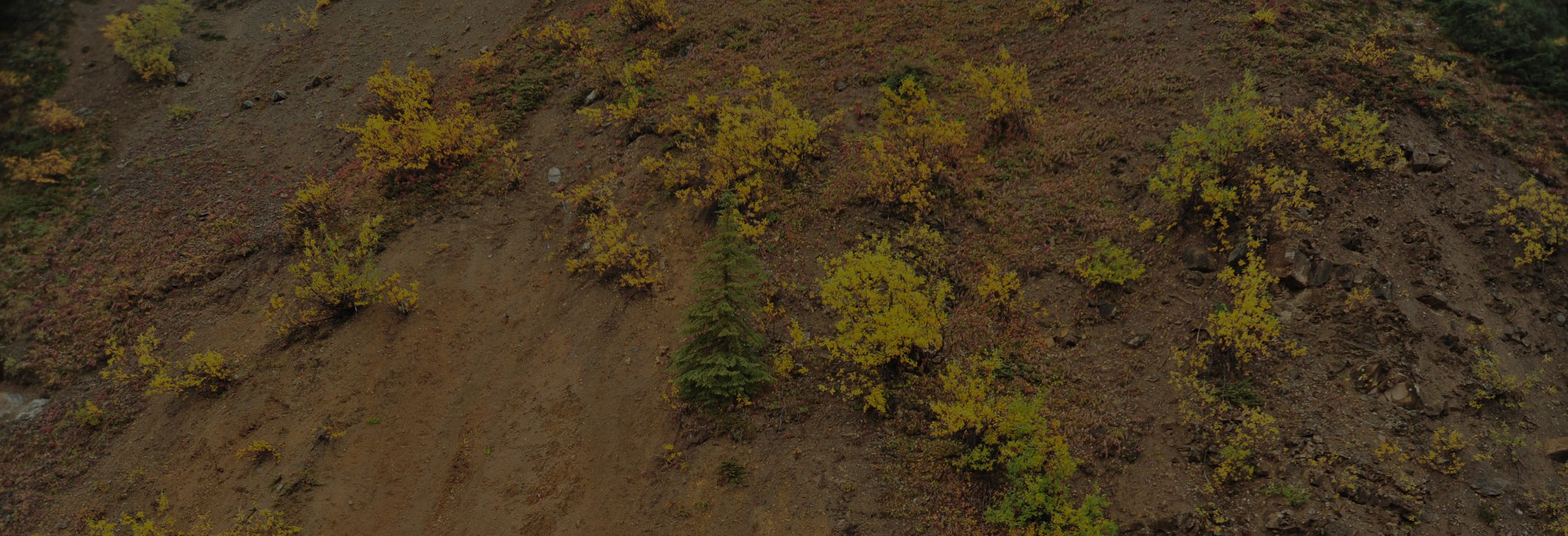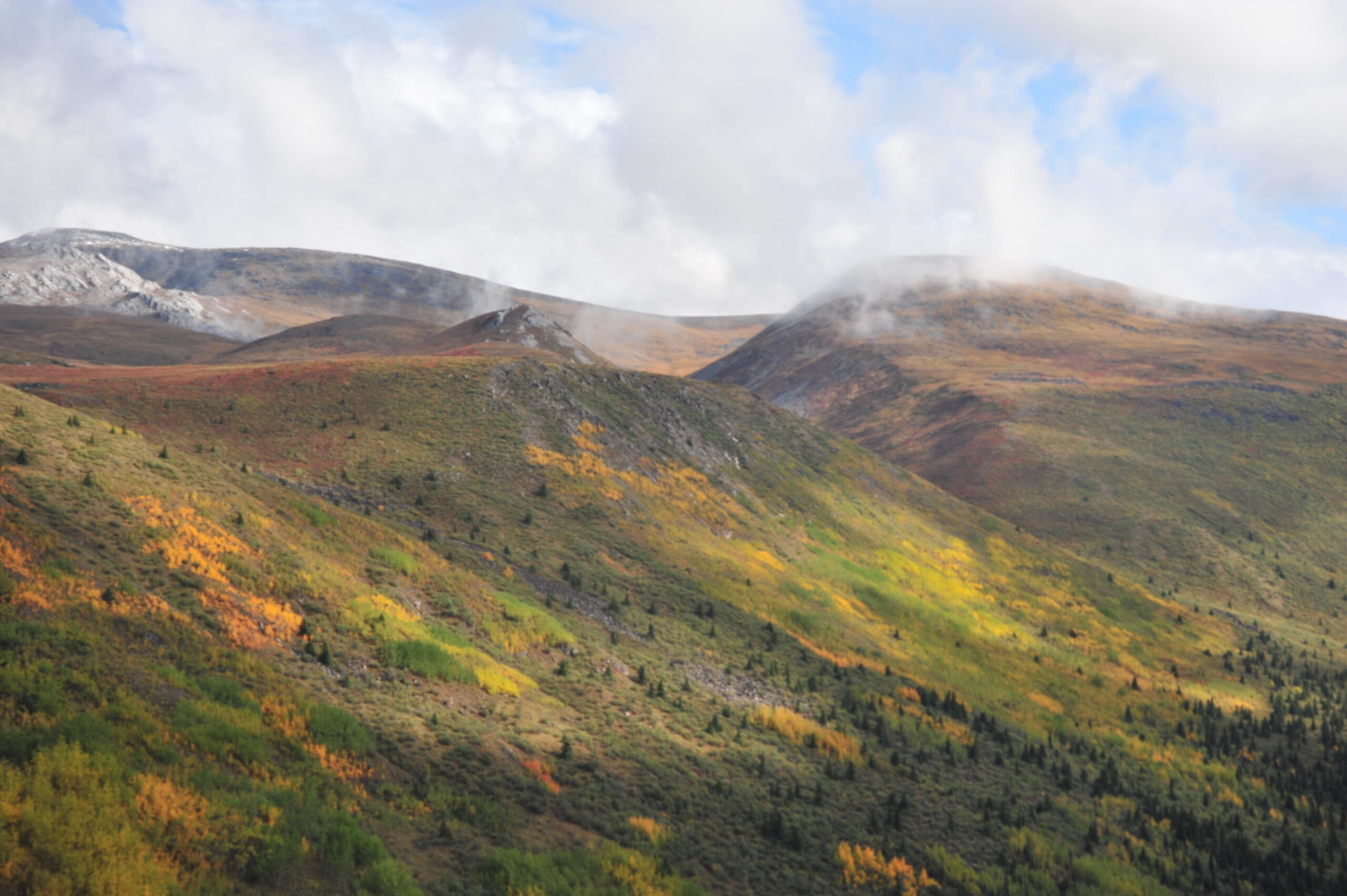- Hole V-22-030 returned 1.06 g/t Au over 161.0 m within broader 282.5 m mineralized interval averaging 0.73 g/t Au, adding width to southeast extension of near-surface, well mineralized corridor at Valley
- Hole ends in mineralization, with final 66.0 m of hole averaging 1.46 g/t Au and final 21.0 m averaging 1.93 g/t Au
- Localized gold intersections at Gracie target (4 km east of Valley) confirm a second reduced-intrusion gold system to be targeted in phase 2 drilling in 2023.
Vancouver, B.C., March 7, 2023: SNOWLINE GOLD CORP. (CSE: SGD) (US OTCQB: SNWGF) (the “Company” or “Snowline”) is pleased to announce additional preliminary assay results from its 2022 drilling programs at its Rogue Project in Canada’s Yukon Territory. Hole V-22-030, drilled on the southeastern margin of Valley’s central mineralized zone, returned 1.06 g/t Au over 161.0 m before ending in strong mineralization (Tables 1 and 2). The result adds scale and tonnage to the southeastern side of this near-surface, well mineralized zone. In addition, results from phase 1 drilling at the Gracie confirm the existence of a second reduced intrusion-related gold system, with a high correlation between gold, bismuth and tellurium values in sheeted quartz veins. Phase 1 results will be used to guide a targeted phase 2 drill program at Gracie in 2023.

“Today’s results continue to highlight and build on the prospectivity of our Rogue Project,” said Scott Berdahl, CEO & Director of Snowline. “A single season of drilling has transformed our Valley Zone from an interesting exploration target to a pre-resource gold project noteworthy on a global scale, redefining the deposit model far beyond what are traditionally low grade, heap-leach systems. The consistency of strong grades and the size of Valley make it easy to understand, translating to lower exploration costs required for delineation, and in the future, lower costs for any potential economic operation. Our results from Gracie demonstrate that Valley is not a one-off—Snowline’s Rogue Project is prospective for multiple gold systems of this scale and intensity. We are excited to resume exploration in 2023 with the dual goals of further advancing Valley and locating additional gold systems just like it.”
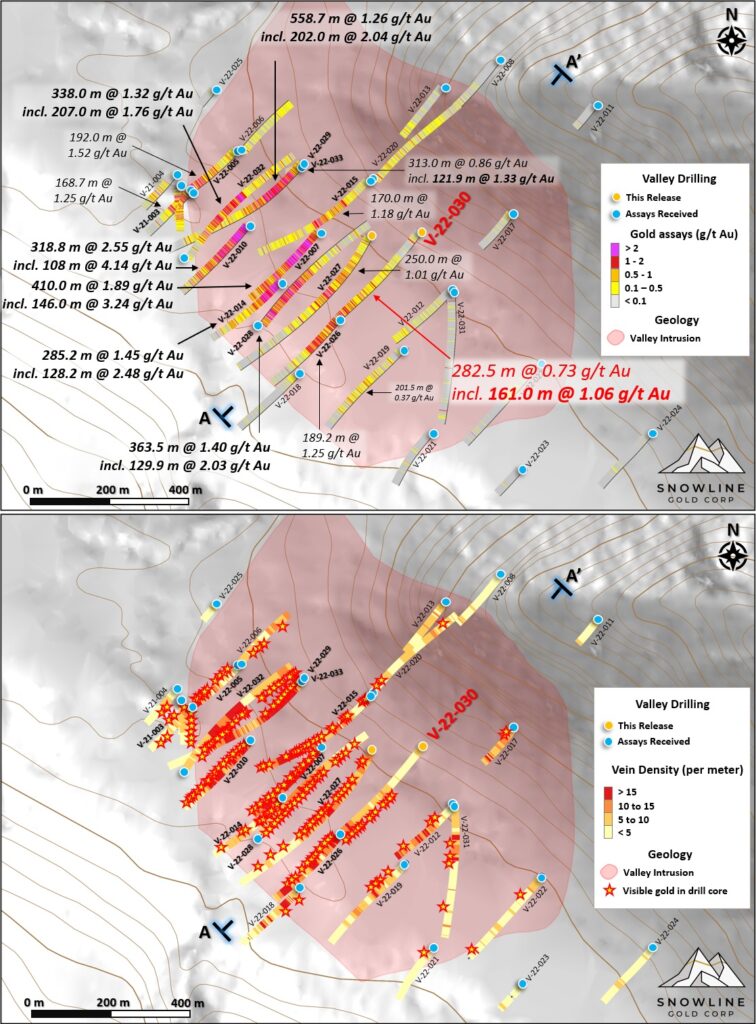
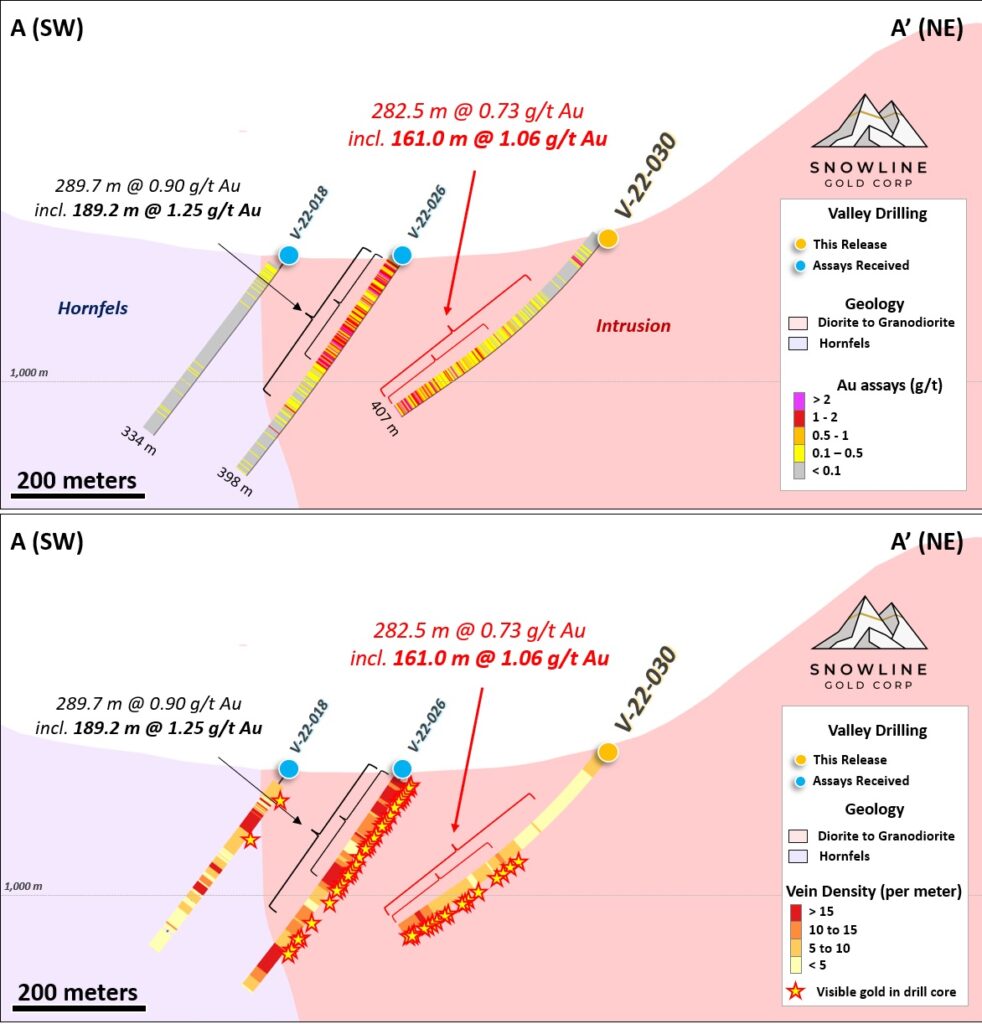
HOLE V-22-030
Hole V-22-030 was collared within the Valley intrusion, to the east of the known near-surface well-mineralized corridor. The hole was a 301 m step-back along section to the northeast from the collar site for V-22-026 (289.7 m @ 0.90 g/t Au including 189.2 m @ 1.25 g/t Au from surface, see Snowline news release dated January 18, 2023), and located 126 m from the nearest hole (V-22-027).
The hole encountered increasingly abundant sheeted quartz veins and trace visible gold as it progressed, returning 1.06 g/t Au over its final 161.0 m from 246.0 m downhole within a broader interval averaging 0.73 g/t Au over 282.5 m from 124.5 m downhole (Tables 1 and 2). The hole was terminated for technical reasons and ended in mineralization. The final 66.0 m averaged 1.46 g/t Au, while the final 21.0 m averaged 1.93 g/t Au.
As with previous holes at Valley, gold grades are carried across broad intervals, and they are not heavily affected by local high-grade (>10 g/t Au) intersections (Table 2).
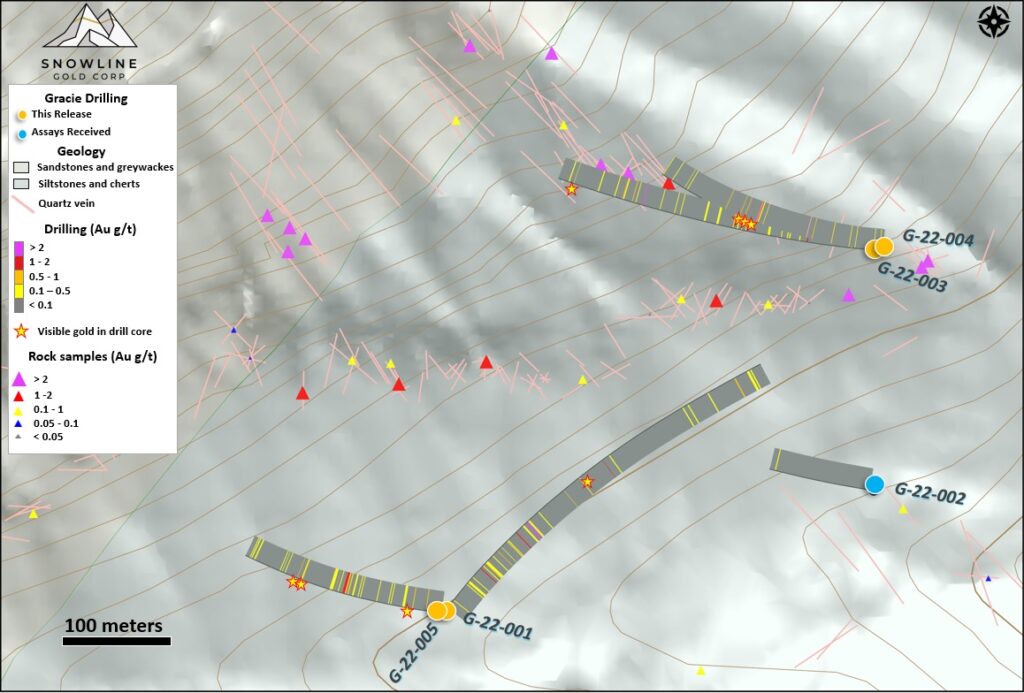
GRACIE
Gracie is a separate reduced-intrusion related gold system (RIRGS) located roughly 4-5 km east of the Valley discovery. Unlike Valley, where the mineralized intrusion is exposed on surface, the causative intrusion at Gracie does not daylight. This presents an attractive exploration target, as the highest gold grades in RIRGS systems are commonly found near the top of a given intrusion. Thus, at Gracie, the strongest part of the gold system is likely to be intact.
Phase 1 drilling at Gracie successfully confirms the presence of a RIRGS. Of the five holes drilled in 2022 (2,152 m total), four intersected zones of high-temperature alteration known as hornfels, indicative of a nearby intrusion. Each of these four holes also encountered trace instances of visible gold associated with bismuth and tellurium minerals in sheeted quartz veins oriented parallel to those at Valley, albeit at low overall vein densities. Geochemical correlations at Gracie in phase 1 drilling are further diagnostic confirmation of RIRGS mineralization. G-22-004, for example, returned 19.45 g/t Au over 0.9 m downhole width, with strong bismuth and tellurium values (378 ppm and 43.1 ppm respectively) and very low arsenic (3.92 ppm), suggesting proximity to a heat source.
Phase 2 drilling is planned at Gracie for 2023, with the objective of intersecting arrays of high-density sheeted quartz vein mineralization within the Gracie intrusion. Multi-element analytical results from the phase 1 program will be used alongside mineralogical observations to identify possible vectors towards the Gracie intrusion.
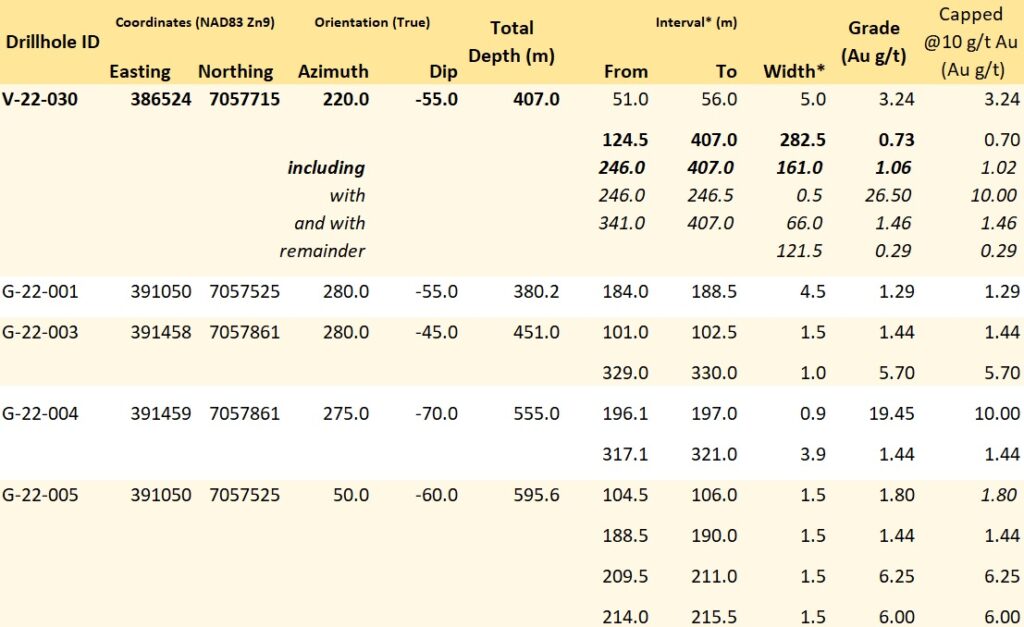
QA/QC
On receipt from the drill site, Valley’s NQ2-sized drill core was systematically logged for geological attributes, photographed and sampled at Snowline’s 2022 field camp. Sample lengths as small as 0.5 m were used to isolate features of interest, otherwise a default 1.5 m downhole sample length was used. Core was cut in half lengthwise along a pre-determined line, with one half (same half, consistently) collected for analysis and one half stored as a record. Standard reference materials, blanks and duplicate samples were inserted by Snowline personnel at regular intervals into the sample stream. Bagged samples were sealed with security tags to ensure integrity during transport. They were delivered by expeditor and by Snowline personnel to ALS Laboratories’ preparatory facility in Whitehorse, Yukon. Sample preparation was completed at different facilities in Whitehorse, Sudbury, ON, Thunder Bay, ON and Langley, BC with analyses completed in Vancouver.
ALS is accredited to ISO 17025:2005 UKAS ref 4028 for its laboratory analysis. Samples were crushed by ALS to >70% passing below 2 mm and split using a riffle splitter. 250 g splits were pulverized to >85% passing below 75 microns. A four-acid digest with an inductively coupled plasma mass spectroscopy (ICP-MS) finish was used for 48-element analysis on 0.25 g sample pulps (ALS code: ME-MS61L). All samples were analysed for gold content by fire assay with an atomic absorption spectroscopy (AAS) finish on 30 g samples (ALS code: Au-AA23). Any sample returning >10 g/t Au was reanalysed by fire assay with a gravimetric finish on a 30 g sample (ALS code: Au-GRA21).
Samples with visible gold and other samples returning >2.0 g/t Au by fire assay, along with a set of randomly selected samples, will undergo further processing, analysing the screen rejects to determine whether the screening process could introduce a sampling bias in current results by excluding coarse gold from analysis, resulting in an under-reporting of true grades. Other biases are also possible.
Results reported herein are considered preliminary following receipt of a low but expected percentage of abnormal assays from standard and blank samples inserted by the Company into the Valley sample stream. (Standard samples are prepared by a third-party laboratory to have known quantities of gold, and blank samples are known to contain very limited concentrations of gold.) Reanalysis of samples run along with these reference materials will provide greater certainty in the final assay numbers. These results will be reported if a material difference is identified between the current assays and the re-run sample batches. Based on the widespread and relatively consistent mineralization throughout mineralized zones, however, the Company does not believe that the re-analysis of this relatively small number of samples will have a significant impact on the preliminary mineralized intervals reported herein.
ABOUT ROGUE
Rogue’s Valley Zone is a newly discovered, bulk tonnage style, reduced intrusion-related gold system (RIRGS), with geological similarities to multi-million-ounce deposits currently in production like Kinross’s Fort Knox Mine in Alaska and Victoria Gold’s Eagle Mine in the Yukon. Early drill results demonstrate unusually high gold grades for such a system present near surface across intersections of hundreds of metres. Gold is associated with bismuthinite and telluride minerals hosted in sheeted quartz vein arrays along the margins of and within a one-kilometer-scale, mid-Cretaceous aged Mayo-series intrusion. Valley is an early-stage exploration project without a resource estimate, and while initial results are encouraging, the presence or absence of an economically viable orebody cannot be determined until significant additional work is completed.
The Rogue Project area hosts multiple intrusions similar to Valley along with widespread gold anomalism in stream sediment, soil and rock samples. Elsewhere, RIRGS deposits are known to occur in clusters. The Rogue Project is thus considered by the Company to have district-scale potential for additional reduced intrusion-related gold systems.
ABOUT SNOWLINE GOLD CORP.
Snowline Gold Corp. is a Yukon Territory focused gold exploration company with a seventeen-project portfolio covering >280,000 ha. The Company is exploring its flagship >137,000 ha Rogue and Einarson gold projects in the highly prospective yet underexplored Selwyn Basin. Snowline’s project portfolio sits within the prolific Tintina Gold Province, host to multiple million-ounce-plus gold mines and deposits including Kinross’ Fort Knox mine, Newmont’s Coffee deposit, and Victoria Gold’s Eagle Mine. The Company’s first-mover land position and extensive database provide a unique opportunity for investors to be part of multiple discoveries and the creation of a new gold district.
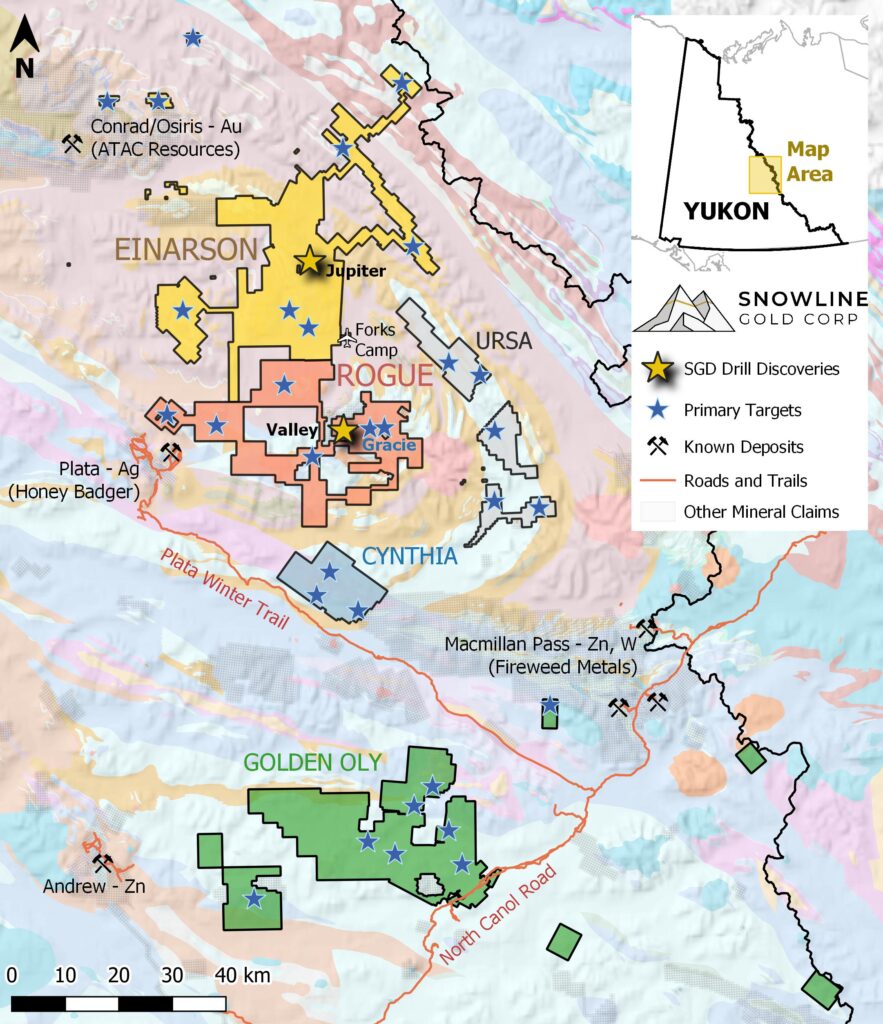
QUALIFIED PERSON
Information in this release has been prepared under supervision of and approved by Thomas K. Branson, M.Sc., P. Geo., Vice President of Exploration for Snowline and a Qualified Person for the purposes of National Instrument 43-101.
ON BEHALF OF THE BOARD
Scott Berdahl
CEO & Director
For further information, please contact:
Snowline Gold Corp.
+1 778 650 5485
info@snowlinegold.com
CAUTIONARY NOTE REGARDING FORWARD-LOOKING STATEMENTS
This news release contains certain forward-looking statements, including statements about the Company’s drill program, results, implied significance of visual inspection of drill core, and surface work and plans for exploring and expanding a new greenfield, district-scale gold system. Wherever possible, words such as “may”, “will”, “should”, “could”, “expect”, “plan”, “intend”, “anticipate”, “believe”, “estimate”, “predict” or “potential” or the negative or other variations of these words, or similar words or phrases, have been used to identify these forward-looking statements. These statements reflect management’s current beliefs and are based on information currently available to management as at the date hereof.
Forward-looking statements involve significant risk, uncertainties and assumptions. Many factors could cause actual results, performance or achievements to differ materially from the results discussed or implied in the forward-looking statements. Such factors include, among other things: risks related to uncertainties inherent in drill results and the estimation of mineral resources; and risks associated with executing the Company’s plans and intentions. These factors should be considered carefully, and readers should not place undue reliance on the forward-looking statements. Although the forward-looking statements contained in this news release are based upon what management believes to be reasonable assumptions, the Company cannot assure readers that actual results will be consistent with these forward-looking statements. These forward-looking statements are made as of the date of this news release, and the Company assumes no obligation to update or revise them to reflect new events or circumstances, except as required by law.
